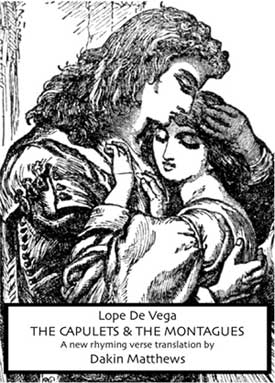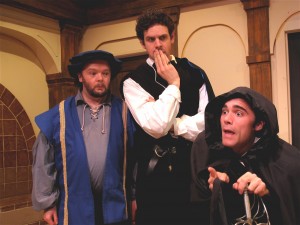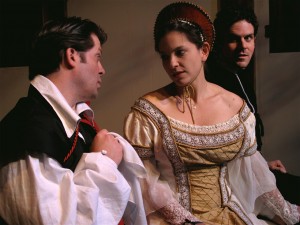BRUSH UP YOUR LOPE DE VEGA
How easy life would be for reviewers if every time they went to the theater, they could see something as absolutely delightful and as thoroughly skillful as The Capulets And The Montagues happens to be.
The coup here is the discovery that Lope de Vega, a Spanish contemporary of Shakespeare, had used the same source material for his play as Shakespeare did for Romeo and Juliet. We are not talking about replacing that great tragedy with de Vega’s charming comedy, but it is not only a pleasant antidote to Shakespeare, it is a sturdy addition to the classical canon. And the translation, receiving its world premiere, is by the estimable Dakin Matthews, and by virtue of the fact that there is no better translator of a classic text – even if Matthews speaks not a word of Spanish – than an actor who knows how to create the kind of ripe language that makes speaking the lines such a rich experience for his fellow actors, the cast, under the artfully nimble direction of Anne McNaughton (Matthews’s wife, making this the happiest of family affairs), is having such a grand old time wrapping their mouths around the words that it proves contagious, flowing from actor to audience in the most delicious manner imaginable. But this is no mere classical reading; this is performing at its comic peak.
The Capulets and the Montagues are still mortal enemies, the Hatfields and McCoys of Verona. Romeo still meets Juliet at a masked ball. The still fall in love at first sight. They still marry in secret. Juliet still takes the potion given to her by Friar Laurence. But instead of moving inexorably towards tragic death, it finds in the plot all sorts of ways to turn these events into farce. Instead of the Bard’s poetry, there is a combination of wicked wit and sheer buffoonery, complete with demonstrations of swordplay both elegant and hilarious. What more could you ask for?
In the lively person of Benny Wills, Romeo emerges both as ideal romantic hero and loose-limbed doofus. Nicol Zanzarella-Giacalone’s Juliet is passionate and assured. These are not hot teenagers; they are, in their slapdash way, ardent sophisticates. When this Juliet speaks to her father from the dead, her other-worldliness is tinged with a spectral irony that is as funny as it is eerily cockeyed. The joys provided by the rest of the cast – and every single one of them is a superb farceur – are equally inspired. The always remarkable John Achorn makes of Capulet, Juliet’s beleaguered father, a man who seems genuinely confounded by the events swirling around him; the confusion is in his eyes even when his body language bespeaks confidence. The comic servants Marin (Romeo’s) and Celia (Juliet’s) possess a cheery sweetness and a kind of knockabout boisterousness, as embodied by Bruce Green and Etta Devine, that makes it absolutely right that they will end up with each other in some rustic paradise. With a minimum of gesture, John Apicella takes on a variety of roles, and makes each distinct, although it is his Prince of Verona who is the most sneakily subversive. Brett Colbeth is too damned attractive to ever be mistaken for anyone but Brett Colbeth, despite the many characters he is called upon to play, but his telling of a story told him by Friar Laurence is priceless tomfoolery. And Kellie Matteson, in a host of brief cameo appearances, practically steals the show, gracing it as she does not only with her beauty but with her freshly conceived take on each character she plays; this is an actress with a fantastic future. Drew Doyle, R. Scott Thompson and Jerry Hoffman complete the fine cast.
Even though this Andak Stage Company production is making its debut in a postage-stamp-sized theater, the space is writ large by the size of everyone’s talent. Michael C. Cook’s set fills the space with a tasteful reproduction of Spanish architecture as it might look on an Elizabethan stage. Dean Cameron’s gorgeous Italianate costumes are quite possibly, in an evening of extraordinary assets, the greatest asset of all. And Peter Strauss wisely dims the lights in a scene that might have been played in darkness but which, instead, allows the actors to create the sense of darkness themselves, which they do with the subtlest of comic flourishes.
It seems fair to say that it is a tad on the longish side and the first act doesn’t get as much earned laughter as the second act, but that is mere quibbling when one considers the fact that The Capulets And The Montagues is both an important event (in that it acquaints us with a largely unknown classic) and, at the same time, the swellest entertainment in town.
photos by John Apicella
The Capulets And The Montagues
Andak Stage Company in North Hollywood
scheduled to close February 27, 2011
for tickets, visit Andak



